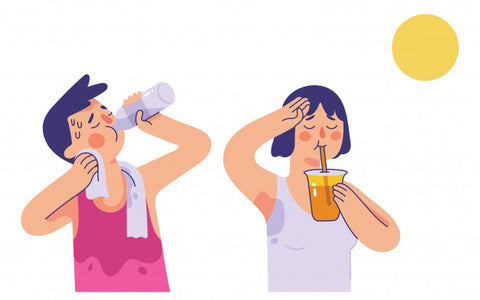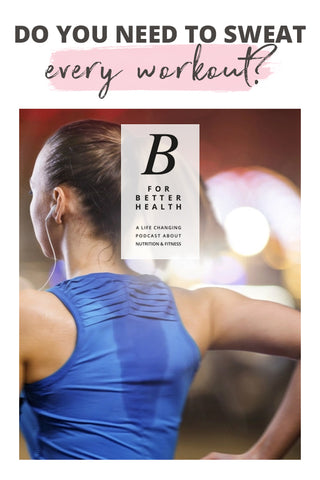Do You Need To Sweat Every Workout? By Personal Trainer and Registered Dietician Baraa El Sabbagh
Sep 14, 2021
First of all, I want to thank you guys for all the questions you send me on Instagram, it helps me help you! I work on these blog posts and podcast episodes to provide you with the answers. This particular post answers 2 of the most common questions I get:
- Do you need to sweat every workout to see progress?
- How many calories should you be burning per session?
- What is a resting heart rate?
If you’d rather hear the answer, head over to my podcast, B for Better Health to listen to the episode.
Are You Sweating After Each Workout?
Some of you might finish a strength training session completely drenched, but on other days while doing a different workout, you don’t sweat at all. Does that mean the no-sweat workout wasn’t as effective?
There are 3 main things we need to know about sweat:
- Sweat is basically the loss of water weight. It’s not an indication of calories lost during exercise.
- Sweat is your body regulating its temperature! When you workout, you’re getting hot, and the sweat is there to cool you off. Some days you’re working out in a hot environment, so you sweat more. Some days you’re doing more HIIT than usual, so you sweat more.
- Each body is different at regulating its temperature! You and your friend could be doing the same exact workout, but she’s dripping by the end of it and you’re as dry as you were during warmup! That doesn’t mean your friend lost more calories, it just means her body is cooling her off differently than yours is.
So does that mean you need to sweat in every workout? Nope, but keep reading to get some really good tips on what to do next to make sure you’re getting the best out of your training session!
Is Weight Attributed To Sweat Loss?

Have you noticed that after a particularly sweaty workout, you lost a little weight? That is considered “water weight”, and you don’t want to lose a lot of it. Too much water weight loss could mean you’re dehydrated, which should always be taken seriously.
With dehydration, you can get lightheaded faster and could possibly faint from over-exerting yourself. BUT, when you drink water before, during, and after a workout, you’ll have MORE energy and motivation to keep going. That’s where weight loss (if that’s your goal) comes in: The more effort you put into your workouts, the more calories you burn. So the only way to put more effort push forward in your workouts is to make sure you’re hydrated.
You don’t have to take a 10 minute break in the middle of your training to chug an entire bottle of water, but do take sips every now and then to remind yourself to stay hydrated, which will keep you going & help you push further in your training.
How Many Calories Should You Burn Each Workout?
The answer is: listen to your heart! Simply put, the higher your heart rate during exercise, the more calories you’ll burn. The effort you put into exercising should challenge you most of the time, because that’s the way you’ll notice a difference in your performance and body.
BUT, the key here is balance. Don’t over exert yourself every single day with muscle training and cardio, that will only lead to injuries and constant soreness. You want to find a rhythm between strength and cardio training, remember to take rest days for your muscles to recover and not OVER do it every time you workout.
Some workouts might have you burning 150 calories, others might be 600 to a 1,000 calories. This depends on effort, but it also depends on MANY different points I mention below.
Instead of getting caught up with the numbers, try to focus on all the ways you’re benefiting your health from working out:
- Your muscles are getting stronger and more toned
- Your mood is probably better and more positive
- You’re losing weight, slowly and surely (of course with the help of a calorie deficit)
- It helps the mind, body, and soul live peacefully and happily
- It can even help you be more productive at work and household chores
It’s not all about calories team, as long as you feel the burn, you’re being challenged, and you’re getting stronger, you can rest easy knowing your muscles are shaping up the way you want!
Resting Heart Rate & Its Effect On Calories
Your resting heart rate can say a lot about your health, a normal heart rate could be between 60 and 90 beats per minute. A person that exercises regularly and eats healthily would probably have a resting heart rate below 80. This number is calculating the effort your heart needs to beat while you’re resting. The more you train your heart, the lower the beats will be when you’re immobile.
There are lots of things that could affect your resting heart rate:
- One of them is genes. If you have relatives with cardiovascular issues, you might want to keep an eye out and watch your resting heart rate. Similarly, a LOW resting heart rate could run in your family, resulting in yours being relatively low even if you don’t exercise often!
- Another reason someone might have a low resting heart rate is because they’ve been training their hearts. After all, it is a muscle! Maybe they’re runners or they’ve been working on their endurance for years. These things take time, but it’s really worth it for your current and future health. You can work on your cardiovascular system and build a stronger heart, too, by continuous strength and cardio training and constant conditioning.
- Another way to lower your resting heart rate is by reducing stress! Try meditating, there are plenty of apps out there to help you, try Calm or Headspace. Try listening to this podcast episode I recorded that encourages you to take time for yourself, and do the things you love to do. This will put you at peace and make you feel a lot calmer, which will definitely help out your heart rate!
- Some days your heart rate might be higher than other days, which can be due to daily factors, like stress or even overtraining! It’s all about balance, right?
How To Increase Your Heart Rate
If your goal is losing a little more fat or wanting to work on your high-intensity performance capacity, try to incorporate:
- High-intensity interval training with your weight lifting.
- Do some sort of movement for active recovery between sets.
- Possibly having active rest days. That could be anything from a long walk, a swim, yoga, or a dance routine!
- Use your fitness trackers during the HIIT sessions to ensure you’re hitting the heart rate you’re aiming at. A few moments of high intensity during your workouts can train your heart properly over time.
This is actually what I do for anyone that signed up for my 8 week program! I provide them with the right balance of muscle exercises, HIIT workouts, and of course, a meal plan because food plays an integral role in your overall progress.
Lose More Calories and Sweat With These Tips
What are some things YOU can do at home to get a higher heart rate, burn more calories, lose weight, and lower your resting heart rate:
- Drink water before, during, and after workouts. Stay hydrated to stay alert and energetic throughout your training.
- Get a fitness tracker! I promise it will make a world of a difference. You need to see your heart rate during a HIIT session to keep pushing yourself.
- Don’t compare yourself to people. Our bodies are special, our genes are different, and everyone’s fitness level is different.
- Focus on the benefits of exercise more than the number of calories you’re burning. Numbers aren’t as important as how good you feel after a workout or how much your endurance has built up over the months! If you feel good, that’s all that matters.
- Try noting your resting heart rate today. Your fitness tracker can tell you or you can measure it yourself. The goal is to lower it and that can be done through training AND relaxing your body which you can do by reducing stress overtime.
There you have it team! I loved recording this episode. Let me know what you think! If you’ve been working on these goals for some time but can’t seem to get there, don’t be hard on yourself. These are big goals and they require a lot of discipline, be patient, you’ll get there. Also remember, I’m available to work with you. I know you hear this from fitness experts all the time, but consistency really is key here guys, and we sometimes need expert help to reach our goals!
Subscribe to one of the top 5 UAE podcasts.
Stay connected with news and updates!
Join our mailing list to receive the latest news and updates from our team.
Don't worry, your information will not be shared.
We hate SPAM. Great content only!


